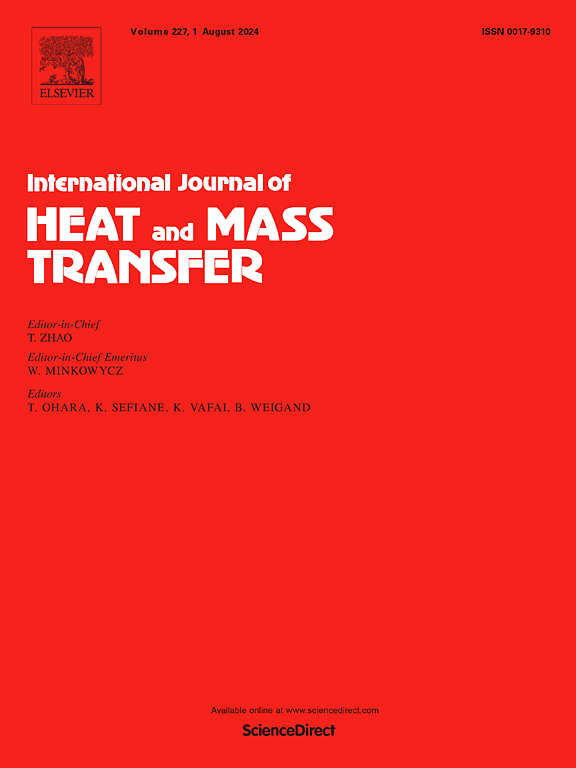基于人工神经网络的环保制冷剂流动沸腾换热系数和摩擦压降预测
IF 5
2区 工程技术
Q1 ENGINEERING, MECHANICAL
International Journal of Heat and Mass Transfer
Pub Date : 2025-06-26
DOI:10.1016/j.ijheatmasstransfer.2025.127428
引用次数: 0
摘要
流动沸腾传热可以有效地满足集成电子器件的散热要求。环境友好型制冷剂由于其低臭氧抑制潜能值和/或全球变暖潜能值而成为传统制冷剂的可靠替代品。本文在质量通量400 ~ 870 kg·m-2·s-1,热流通量40 ~ 65 kW·m-2,饱和压力0.6 ~ 0.8 MPa的条件下,对R1234yf和R1234ze(E)在1.88 mm圆管内的流动沸腾换热系数(HTC)和摩擦压降(FPD)进行了一系列实验。基于环境友好型制冷剂的流动沸腾HTC和FPD数据库,建立了人工神经网络(ANN)模型并进行了训练。ANN模型较好地遵循了流动沸腾HTC和FPD的趋势,最小平均绝对偏差(MADs)均为8.3%。不同的无量纲参数组合作为人工神经网络模型的输入层对预测精度有显著影响。基于已编译的数据库,将人工神经网络模型与两期HTC和FPD的几个经验相关性进行了比较。对比结果表明,对于HTC和FPD数据库,人工神经网络模型的最小MADs分别为15.2%和12.5%,远小于经验相关的最小MADs,表明人工神经网络模型优于经验相关,可以获得更满意的预测结果。本文章由计算机程序翻译,如有差异,请以英文原文为准。
Prediction of the heat transfer coefficient and frictional pressure drop for flow boiling of environmentally friendly refrigerants based on an artificial neural network
Flow boiling heat transfer can effectively satisfy the heat dissipation requirements of integrated electronic devices. Environmentally friendly refrigerants have become reliable substitutes for traditional refrigerants due to their low ozone depression potential and/or global warming potential. In this paper, a series of experiments on the flow boiling heat transfer coefficient (HTC) and frictional pressure drop (FPD) of R1234yf and R1234ze(E) in a 1.88 mm circular tube were conducted with mass fluxes of 400–870 kg·m–2·s–1, heat fluxes of 40–65 kW·m–2, and saturation pressures of 0.6–0.8 MPa. Artificial neural network (ANN) models were built and trained based on the flow boiling HTC and FPD databases on environmentally friendly refrigerants. ANN models followed the trend of flow boiling HTC and FPD well, with minimum mean absolute deviations (MADs) of both 8.3 %. Different combinations of dimensionless parameters as the input layer of ANN models significantly affected the prediction accuracy. Based on the compiled databases, ANN models were compared with several empirical correlations on two-phase HTC and FPD. The comparison results show that the minimum MADs of ANN models for HTC and FPD databases are 15.2 % and 12.5 %, respectively, which are much smaller than the minimum MADs of the empirical correlations, indicating that ANN models are superior to empirical correlations and can obtain more satisfactory prediction results.
求助全文
通过发布文献求助,成功后即可免费获取论文全文。
去求助
来源期刊
CiteScore
10.30
自引率
13.50%
发文量
1319
审稿时长
41 days
期刊介绍:
International Journal of Heat and Mass Transfer is the vehicle for the exchange of basic ideas in heat and mass transfer between research workers and engineers throughout the world. It focuses on both analytical and experimental research, with an emphasis on contributions which increase the basic understanding of transfer processes and their application to engineering problems.
Topics include:
-New methods of measuring and/or correlating transport-property data
-Energy engineering
-Environmental applications of heat and/or mass transfer

 求助内容:
求助内容: 应助结果提醒方式:
应助结果提醒方式:


